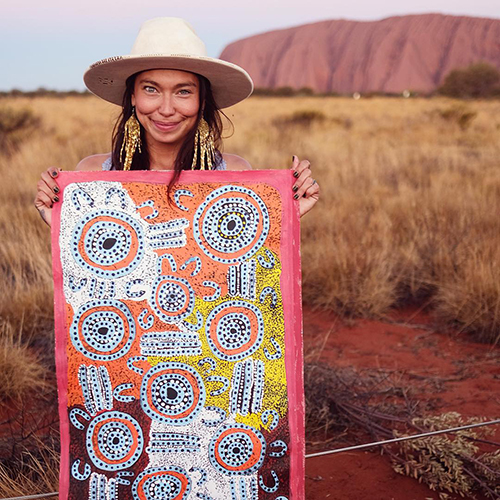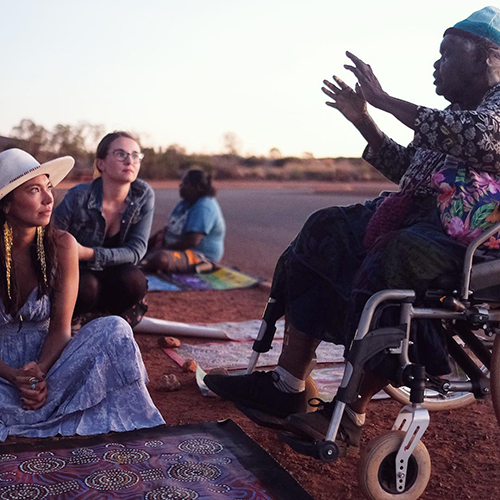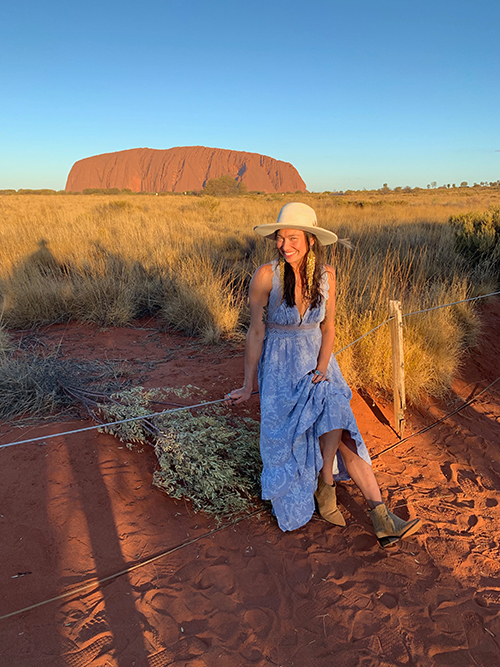
Welcome to our new travel series… Women In Travel! In this series of Q&As with influential women who are passionate about travelling, we will see how they are changing the way we think, perceive and do actually travel. Even during a pandemic the importance of how women impact the tourism and travel world is remarkable. Women, of all backgrounds and at all levels, are at the core of the travel industry. From CEOs, to content creators to writers, tour guides, business owners and more. We wanted to take the time to let them shine.
And we couldn’t be more excited to have Sarain Fox as our first feature. Sarain is Anishinaabe from Batchawana First Nation, just outside of Sault Sainte Marie, Ontario. Her passion for empowering Indigenous communities and amplifying their voices, will instantly draw you into her stories and want to see through her lens. She’s an artist and activist, a storyteller, a dancer and a choreographer, a stylist, brand ambassador, television host and content producer. She’s also an ambassador for TreadRight. The way she travels and tells the stories of the people in each destination is what travel really is all about–the people more than the sights.
Read on to be captivated by Sarain’s stories, get inspired and think about travel in a very different way…
What was your first travel experience? How old were you? Why does that moment still stick with you?
We moved to Arizona when I was 4. I travelled across the country sitting in my mom’s station wagon. We stopped at all sorts of magical places along the way. I fell in love with road trips and that’s how I like to see the world; whether I’m in the driver’s seat or a passenger window.
What does travel mean to you?
My ancestors used to write their songs based on the shape of the tree line. So travel is about finding new tree lines and new songs.
Learning about who you are is as important as learning about the people you meet in new places.

How have your travels changed as an Indigenous woman? I’d love to get your reflections on that…
At 32 years old, I haven’t seen Europe yet and neither has my partner. I’m an Indigenous woman who lives on her homelands. My partner has Irish ancestry and she’s never been “home.” When I travel from my home, I bring myself and my ancestors with me. I know my creation story and I know where my greatest grandmothers picked the same berries for generations. Learning about who you are is as important as learning about the people you meet in new places. So when I visit someone else’s homelands, I try to bring my own story. We have to be careful and mindful to honour the truth of people we meet too. No matter what you read in a tour book, no stories are as powerful as the original stories of the land.

Can you tell me a bit about your work with TreadRight? How did that start for you?
I was connected with TreadRight through my work with Manitobah Mukluks. We met in 2018 at a Storyboot School event in Toronto and realized that we were aligned on the purpose and opportunity offered by sustainable tourism. I began working with TreadRight on a joint project with Contiki Cares, when I travelled to Australia with them in 2019 to meet with Indigenous owned experience providers. Then I joined Contiki’s 9-day Outback Adventure trek which took us through the Australian Outback and and and included three nights in Uluru, the sacred site of the local Yankunytjatjara and Pitjantjatjara Anangu (people). I was scheduled to be in New Zealand this August to meet with Indigenous tourism leaders this year as well, but sadly that was cancelled as a result of COVID-19.
My role with TreadRight is as their ‘People’ Ambassador. A core part of TreadRight’s work is to share stories about the role and value that sustainable tourism can have on communities around the world and I seek to uplift the voices of Indigenous communities, so we work to support one another’s goals

How do you see travel impacting women in your day-to-day life?
In my grandmother’s generation, to travel alone as a woman was considered a faux pas. Exploration was treated as men’s business. But traditionally, women in my culture were responsible for our migration and moving our families. Now, it’s important for Women to see themselves travelling and expressing their sovereignty in the world; able to move and define their own stories. My aunty (our oldest matriarch) taught me that movement is equivalent to freedom.
When women’s voices are included in the stories we hear about places, we learn more about the realities and ways of life there.
Women are the glue in most cultures. They carry our teachings and accommodate life. When women’s voices are included in the stories we hear about places, we learn more about the realities and ways of life there.

Is there a woman you met on your travels who inspired you in some way?
One of my favorite stories is when I went to San Francisco and met Sammy Sunchild who owns a BnB that used to be a hotel where Janis Joplin and Joni Mitchell would stay. She made little “peace cards” for her café that you had to read to meet new people. They had cute little conversation starters and topics to get you talking. She represents that generation of feminists and artists who are still making change. She gave me an optimistic and nostalgic perspective about human connection.
Travel needs to be accessible to women and young children so everyone can experience the rich tapestry of life out there.

What would you say to women, particularly Indigenous women or women of colour, to encourage them to travel?
I think travel is freedom and representation matters. I encourage women to travel and share their stories.
It’s important for women to be represented in the world and to feel safe being mobile (whether alone or in groups). Travel needs to be accessible to women and young children so everyone can experience the rich tapestry of life out there.
That fear exists whether I’m home or abroad. The realities of life are different for Indigenous women. We’re targeted and more at risk than other people.
Have you ever travelled solo? Where did you go? What was that experience like?
I almost always travel solo. Even in a group, I find solace spending time alone. My work naturally brings me to diverse communities to focus on important and intense issues. So I try to build in time in nature to process and unwind.

What has travel taught you about yourself?
Travel taught me to see the world outside of myself and to honour other people’s homelands. It is a privilege and it reminds me to be respectful of the cultures I experience. Diversity is important and we shouldn’t travel with the hope of fitting in. We all carry a unique story and perspective. The best way to travel is to exchange and dialogue from our own realities.
Did you have any fears about travelling as a woman? Or as an Indigenous woman?
Yes. Absolutely. That fear exists whether I’m home or abroad. The realities of life are different for Indigenous women. We’re targeted and more at risk than other people. I’ve been taught from a young age to protect myself. I try to trust my instincts and I walk in a good way. I feel protected by my teachings. And I seek community or other women wherever I go to feel safe. As woman, I carry awareness that my sexuality can be targeted or put me in danger.

I find it confronting when travellers don’t respect traditional knowledge or come with an “explorative” or a “conquering” mentality.
Has travel posed any challenges for you as a woman? How do you confront them and continue on?
I follow the traditions of the original people. In Australia, I found that challenging because settlers don’t tend to follow traditional protocol. Sometimes there are gendered roles, responsibilities and sacred places. I’ve been left behind on tours because I wanted to respect the cultural boundaries of those places. I find it confronting when travellers don’t respect traditional knowledge or come with an “explorative” or a “conquering” mentality.
Any final thoughts on travel and the future of travel for women, and Indigenous women?
Travel is in a state of transformation. I think we’re seeing shifts towards sustainability and accountability. Experiences are slowly becoming more immersive and authentic. Look around. Who’s voices are being heard? Who is telling the stories? It’s urgent now to be critical of the representation we see in the world.

